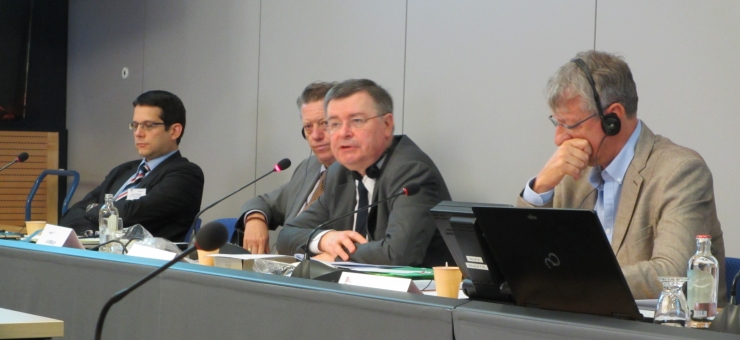Social Dialogue: Hairdressing Sector social partners adopt Joint Resolution on “Securing employment in the hairdressing sector”

At its meeting in Brussels, Belgium, on 13 October 2014, the Sectoral Social Dialogue Committee (SSDC) on Personal Services adopted the Joint Resolution: “Securing employment in the hairdressing sector”.
The Resolution addresses key labour market developments in the Hairdressing sector and recommends key actions for the future:
Coiffure EU and UNI Europa Hair & Beauty observe with concern that the barber and hairdresser profession in Europe is under threat of increasing marginalisation.
This development manifests itself in the fact that the number of barbers and hairdressers who are delivering their services to the consumer as a spare‐time income without the professional environment of a shop is constantly increasing. This development is due in part to tax incentives but also as a result of the wholesale elimination of barriers to market access in the EU Member States. In recent years, these circumstances have given rise to ruinous competition and declining prices, which in turn have an extremely negative impact upon both the employment situation and professionally managed and run hairdresser’s and barber’s shops.
A recent study from Germany (German Institute for Economic Research [Deutsches Institut für Wirtschaftsforschung – DIW]) shows that many self‐employed entrepreneurs declare an hourly wage that falls below national minimum wage in many European countries.
This clearly has consequences for the prices of services in the hairdressing sector, prices often not in a position to even cover operating costs themselves, as roughly half of the costs associated with a hairdressing service are personnel costs. A vicious circle is emerging. Price pressure leads to layoffs of employees who, in turn, attempt to survive in the market by establishing microenterprises of their own. Some employers encourage their workers to take on the precarious statute of independency in order to escape social obligations. The rate of low‐income, self‐employed individuals has steadily climbed in nearly all countries of the EU and in some cases amounts to 70%.
In light of the ruinous price competition, in the simple effort to survive, many also attempt to avoid tax payments. The share of clandestine workers in the hairdressing sector is estimated to account for 20‐30% of regular sales.
Coiffure EU and UNI Europa Hair & Beauty see the professionalization of the trade as an opportunity to bring these negative consequences to a halt. In their view, this can only be achieved through the establishment of consistent quality and social standards in all EU countries. To this end, within the scope of social dialogue, both social partners have already created a special European Hairdressing Certificate, consisting of two quality levels, that lays down criteria for the exercise of the profession both as an employee and as a self‐employed individual or business manager (European Hairdressing Certificate).
The social partners consider that salary and working conditions should be negotiated nationally at sectoral level in order to attract talent and avoid competition regarding salary. Maintaining a high level of social standards contributes to the conservation of professional quality in the sector. It is important that the member states supervise social and fiscal regulations correctly through the inspection services. The social partners commit themselves to fight against moonlighting or irregular work and denounce all forms of unfair competition.
Coiffure EU and UNI Europa view market regulation via demonstration of such levels of quality as an opportunity to put a stop to marginalisation of the industry. States that have already had measures such as these in place for years have more professional hairdresser’s salons as a result – operations that not only create jobs but that also train junior staff. As a rule, these States also have lower levels of youth unemployment.
In April 2012, Coiffure EU and UNI Europa entered into an agreement for the protection of health in the hairdresser’s and barber’s trade, as skin ailments in particular represent a disproportionate problem in the hairdresser’s trade, due above all to constantly working in a humid environment. This permits materials with allergenic or skin‐irritant properties to overcome the natural skin barrier. An important element of the agreement is the establishment of suitable protective measures in regulations applicable to training and development. States that have long since established corresponding measures as part of their professional training enjoy enormous success in the effort to combat occupational illnesses. This is the case, however, only to the extent that people can be reached who undergo training measures. Free and open access to the market, without any demonstration of skills or expertise in the hairdresser’s trade, jeopardises the implementation of this important agreement to protect health in the industry and bring enormous cost relief to businesspersons in this sector.
The cosmetics used in the hairdresser’s trade are subject to the strictures of the European Cosmetics Directive. The use of even these products in a hairdressing business, however, involves not inconsiderable liability risks for the hairdressers and barbers who use them. Improper handling, particularly of hair colouring agents and products that modify the hair structure, can lead to very high claims for damages. Recent court decisions demonstrate this. It is thus indispensable to ensure careful dealing with products of this nature through quality criteria applied in examinations or by means of certifications. This, too, promotes one of the objectives of the EU Commission: improvement of consumer protection.
The European social partners, against this backdrop, call upon the Commission to secure employment in the hairdresser’s trade, and not to jeopardise the profession through the complete elimination of all regulations on market access concerning quality criteria. Such a wrong policy would turn an important objective of the EU – that of promoting employment – on its head. It would also send the wrong signal.
The hairdresser’s trade fulfils an important mission by contributing to people’s sense of well‐being, strengthening their self‐esteem and making a positive contribution to coexistence in society. Misguided course adjustments must not be permitted to impede or destroy this important mission.
The adopted Resolution is annexed.

